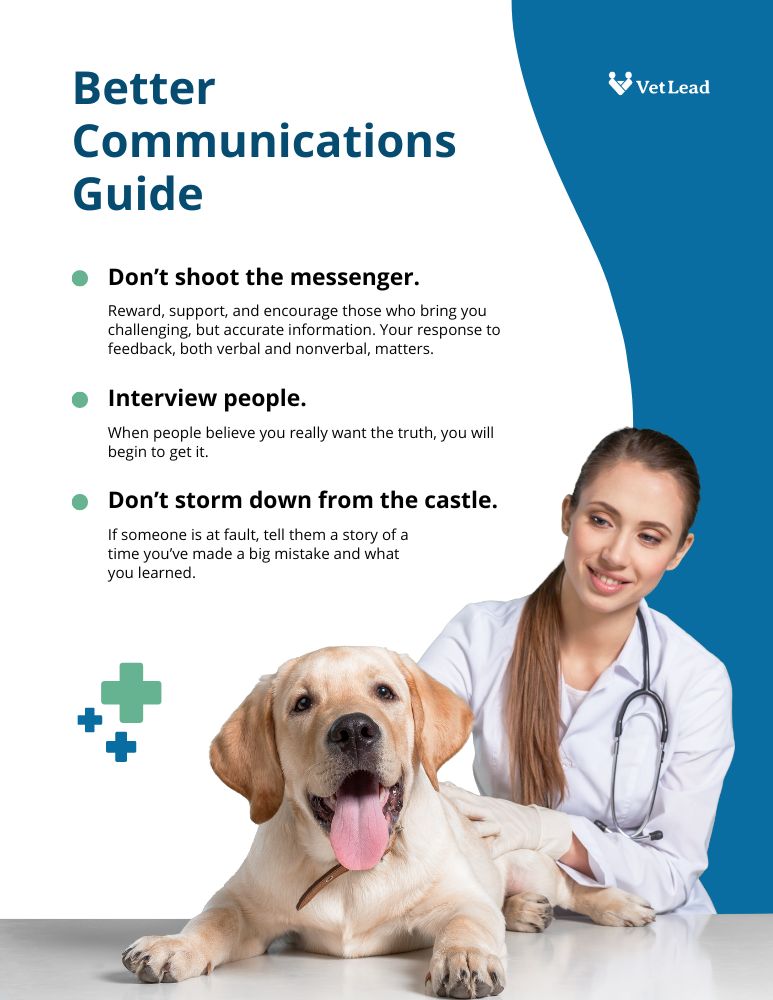Check our the recording of our latest live event, Ready for the Next Step in Your Career?
I was working with a veterinary practice owner recently who told me, “My team is very honest with me. I’ve told them that it’s okay to bring me bad news and so they do.” I’ve heard this statement, in some form, from many owners and managers over the years.
In most cases, it only takes a few conversations with the team to learn that this isn’t the the case.
The leader often is getting a more optimistic version of reality. And while this version might not be completely false, it’s a long way from the clear picture they need to chart the correct course for their team and for their veterinary practice.
When leaders aren’t getting all the information, whether positive or negative, that’s when ineffective decisions are made.
Open and Honest Communication
One of the first things I do with many practices is execute a cultural survey. The feedback from this survey helps them get a clear picture of the current state of their practice. One of the things we look at together is open, honest communication.
Often times, the practice manager’s perspective is that open, honest communication is happening in their practice. However, their employees view this as a real area of concern.
Do you want to create a culture where consistent, candid communication happens? Where the decisions you make are based on reality, not a sugarcoated version of it? Then you have to make sure the behaviors you exhibit encourage and support that kind of environment.
Here are three things you can do to increase the level of candor in your veterinary practice:
1
Don’t shoot the messenger.
Reward, support, and encourage those who bring you challenging, but accurate information. Your response to feedback, both verbal and nonverbal, matters.
When you are presented with difficult information, start by thanking your employee for sharing. Acknowledge that it wasn’t easy to hear, but you sincerely appreciate them having the courage to share it. Explain that you need clarity to make good decisions and that their candor helps create that.
When you offer positive recognition to employees for being honest, they will be less fearful about doing it again in the future.
2
Interview your people.
When you control someone’s pay, their promotions, and in a lot of ways, their future, their very strong inclination is to keep you happy.
Sometimes, you have to push to get the real story. If you suspect there’s more to the issue, you have to treat the conversation much like you would a job interview; applicants often hide their flaws in an interview, but if you ask enough of the right questions, you can find them.
The same is true in this situation. Be aware that you are usually getting a slightly prettier version of reality. Dig for the truth by asking questions like, “If you could change or fix one thing about our practice, what would it be?” Or, “What’s getting in our way and keeping us from becoming more successful as a team.”
When people believe you really want the truth, you will begin to get it.
3
Don’t storm down from the castle and beat the villagers.

Is your reaction to bad news to go find the responsible parties and make them pay? If this is the case, your team is probably reluctant to share tough news.
When people make mistakes, the best leaders look at those as learning opportunities. That’s when you pull your team together and work on solutions without casting blame. This will earn the trust that causes employees to be more comfortable with sharing difficult news.
If someone is at fault, sit them down and tell them a story of when you’ve made a big mistake. Share what you learned and ask how this experience will cause them to do things differently in the future. Your job is not to punish the people who make mistakes. It’s to create more capability on your team because of what people learn from making them.
Concluding
Your team knows things you don’t. They are often closer to the action and to the problems. You need their candid perspective to anticipate challenges, make course corrections, and decide where to place your biggest bets.
Leading a practice or a team isn’t easy. And doing it with only part of the story is a recipe for disaster. Be the leader who earns trust and creates a culture where honesty and candor are sincerely valued, not just talked about. Do that and you will create a veterinary practice where people speak their minds, innovate more easily, and give you the information you need to chart a course for growth.
Let us know what you think in the comments section below.



Thank you for this! Best thing I did as a Technician Manager was to do a broad anonymous survey of where my team thought we could use improvement and what their biggest complaints were. I now meet with them individually every month and ask them how we are doing as a company and how I can help.